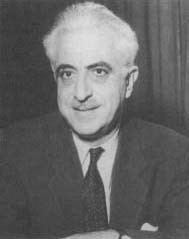Pincus, Gregory
Endrocrinologist Gregory Pincus (1903-1967) is best known for developing the oral contraceptive, or birth control pill. He also investigated the biochemistry of aging, arthritis, cancer, and the adrenal system's response to stress.

Pincus was born in Woodbine, New Jersey. Both of his parents had interests in agriculture and the arts, and his father taught at an agricultural school. In 1924 Pincus graduated from Cornell University, where he not only studied science but founded a literary magazine. In 1927 he received master's and doctoral degrees from Harvard University.
After further study in Europe, Pincus joined Harvard's biology faculty. In 1938 he joined the faculty at Clark University, in Worcester, Massachusetts, as an experimental zoologist (a scientist who studies the behavior and lifestyles of animals). In 1944 he co-founded the independent Worcester Foundation for Experimental Biology, where he continued earlier research on the way the reproductive system and female hormones worked.
Sex Hormones
Ever since the discovery of sex hormones, scientists had been searching for a safe, effective way to use these hormones to either increase a woman's chances of becoming pregnant, or keep her from getting pregnant at all. Several scientists in the 1920s proved that the hormone progesterone prevented ovulation (release of an ovum from the female), but it was very hard to synthesize for widespread use.
Subsidized Study
Birth control advocate Margaret Sanger (1879-1966) noticed Pincus's research and arranged to get him financial research support from philanthropist Katherine Dexter McCormick (1875-1967). In the 1950s, Pincus and his colleagues focused their efforts on developing a hormone combination that would fool the woman's body into thinking it was already pregnant, thus keeping any new ova (eggs) from being released.
Biologist Min-Chueh Chang carried out the experiments on laboratory animals. He worked with various compounds of progestin, a synthetic progesterone developed in Mexico by American chemist Carl Djerassi (1923-) and physician John Rock, who had already been experimenting with progesterone to cure infertility.
Tests of the new substance were carried out in several states, including California and Massachusetts. Because contraception was illegal in Massachusetts, the initial tests were to treat infertility rather than prevent pregnancy. In 1960 the compound was approved by the U.S. Food and Drug Administration as the first contraceptive pill. The pill was manufactured by G. D.Searle Company under the name Enovid. Enovid was sold only by prescription.
Gregory Pincus continues to be hailed as the primary force behind the oral contraceptive. Among the many honors he received during his life-time was membership in the National Academy of Sciences.
Comment about this article, ask questions, or add new information about this topic: